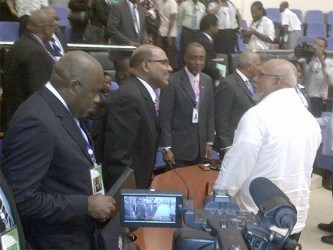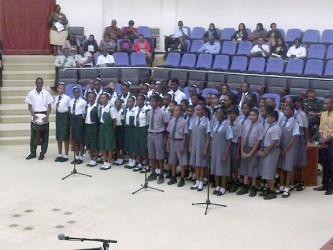As legislative bodies within the Commonwealth group of countries continue to change, they must examine themselves to determine if they are meeting the needs of those they represent and resolve to make changes wherever required, according to Speaker of Guyana’s National Assembly Raphael Trotman.
Trotman made the declaration yesterday during the opening ceremony of the 16th Biennial Regional Conference of Presiding Officers and Clerks of the Caribbean, the Americas and the Atlantic Region of the Commonwealth Parliamentary Association (CPA), at the Guyana International Conference Centre.
Over the next three days, Speakers, Deputy Speakers, Clerks and other officers from 15 legislative houses within the CPA will commune to discuss matters, including the role of the Speaker in a changing Parliament; the role of the Speaker and other presiding officer in the protection of privileges of members; and whether resolutions have the force of law.
The states represented are: Anguilla, Barbados, Bermuda, Canada, Grenada, Guyana, Jamaica, Montserrat, Trinidad and Tobago, St Kitts and Nevis, St Lucia, St Vincent and the Grenadines, Turks and Caicos and the Bahamas.

Even as Trotman outlined some of the topics up for discussion, he noted the fact that there are several issues which currently face legislatures, including Guyana’s National Assem-bly and suggested that the conference, and other similar initiatives, might be just what are required to breach the impasses experienced.
Guyana’s 2011 elections resulted in the unprecedented situation of the opposition holding a one-seat majority in the make-up of the National Assembly. As a result, since the start of the Tenth Parliament Trotman has been thrown into uncharted waters, including having to determine whether Home Affairs Minister Clement Rohee would be allowed to speak and execute his mandate in the National Assembly when the opposition sought to ‘gag’ him to give effect to the passage of a no-confidence motion against him. Trotman was also asked to decide whether an opposition motion to re-order the government’s business would go through. Since the opposition’s superior numbers allowed them to pass the motion, Trotman decided to allow it.
Trotman also noted the fact that several motions shave been passed, but have not been operationalised.
Clerk of Guyana’s National Assembly Sherlock Isaacs said that the conference has a lot of potential. The role of the legislature, he told his parliamentary counterparts, is as critical today as it was in recent times, since it is at this level that the interest of the people are addressed.
He said that the conference will provide an opportunity for each parliament represented to examine themselves and each other and he opined that such interaction might just produce an outcome which will see each legislature better addressing the needs of those they represent.
Referring to conferences past, Trotman said that the topics to be discussed over the next few days are relatively new, although they may contain elements of previously discussed issues. He also lamented the seemingly unstructured patterns in terms of the topics discussed at previous conferences, and said that a more structured approach to discussion is needed if the impact desired is to be seen.

By doing this, Trotman told his counterparts, the Parliaments of the CPA will be able to create their “own stream of parliamentary procedures,” as opposed to adopting the procedures of other territories. Even the Westminster System, used by many Commonwealth nations as their legislative system, should be examined to determine if it is effectively serving the interest of a people, or if an alternative system would better serve that mandate, he said. This charge was echoed by Prime Minister Samuel Hinds during his speech at the ceremony.
In addition, President Donald Ramotar and Opposition Leader David Granger made brief remarks at the opening.









